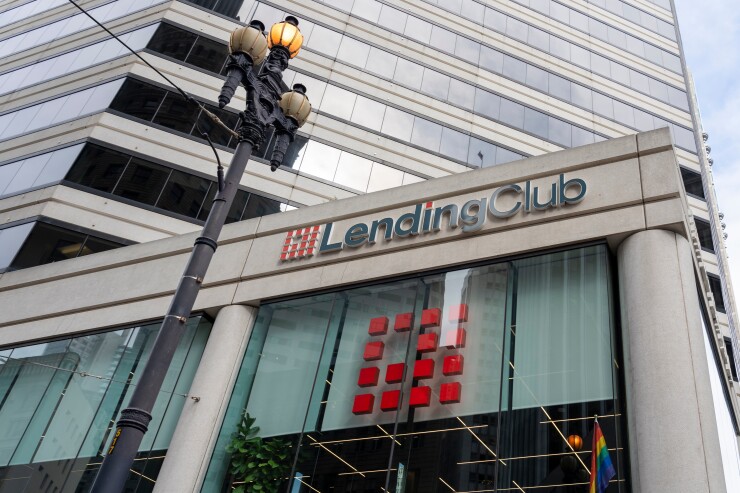Want unlimited access to top ideas and insights?

LendingClub reported increased revenue and net income for the second quarter of this year, exceeding Wall Street expectations.
The San Francisco-based lender posted a net income of $38.2 million in an earnings report released after market close on Tuesday, achieving a 156% increase
LendingClub also reported $248.4 million in revenue for the quarter, a 33% increase over the previous year. The company attributed the increase to its two different revenue streams: marketplace loan sales and interest income from the loans it keeps on its bank balance sheet.
"The highly scalable nature of the marketplace enables rapid growth during periods of strong demand in the capital markets, and the bank balance sheet provides a durable, recurring revenue stream to sustain the business through all economic cycles," said LendingClub Chief Financial Officer Drew LaBenne in the company earnings call.
Diluted earnings per share for LendingClub came to $0.33 in the earnings report, beating S&P consensus estimates by 120%.
The bank did set aside a provision for credit losses of $39.7 million, a 12% increase from $35.6 million a year earlier. However, the provision was reduced from the
"The increase in provision at the end of Q1 was what we call the qualitative provision, which was really just looking forward to the economic signals of
Last month LendingClub launched
"While it's still early, the initial results are encouraging," Sanborn said. "We're now opening six times more checking accounts per day than prior to launch, with nearly 60% of these accounts being opened by borrowers."
Sanborn also said that the bank is looking at a rebranding in connection to its recent product launches.
"A name that gives us broader permission than LendingClub, since lending is in the name, would be very helpful," he said in response to an analyst question on rebranding updates. "We are actually doing that work this year. We've brought an agency on board to do the research and development. In terms of timing, it'll likely be next year."
The bank's outlook for the third quarter estimates $2.5 to $2.6 billion in loan originations, an increase from the $2.1 to $2.3 billion in loan originations
"Q2 results demonstrated the bank's ability to quickly turn the growth spigot back on with impressive operating leverage," said Tim Switzer, vice president of equity research at KBW, in an analyst report. "Assuming the U.S. is able to avoid a significant consumer credit cycle, [LendingClub] is facing an objectively improving environment with many positive catalysts ahead of it."
Shares in the company were up over 20% in premarket trading on Wednesday.
LendingClub was initially founded in 2006 as a peer-to-peer lending platform on Facebook. The business drew attention as a new, tech-driven way to connect lenders with borrowers, attracting investments from Google and other large stakeholders. LendingClub went public in 2014, raising about
The lender then struggled with a series of lawsuits and financial problems, with the founder Renaud Laplanche
Since then, the company has turned to more conventional sources of funding for its loans. In February 2021, LendingClub acquired Boston-based
Earlier this year, the bank acquired the intellectual property and "select talent" behind
LendingClub also




